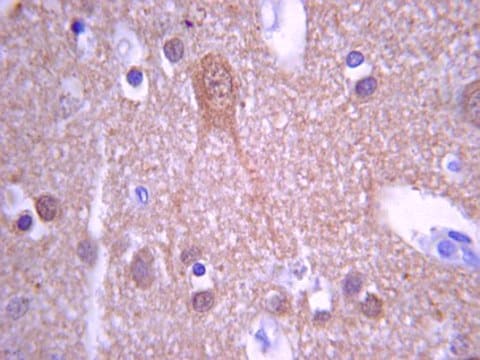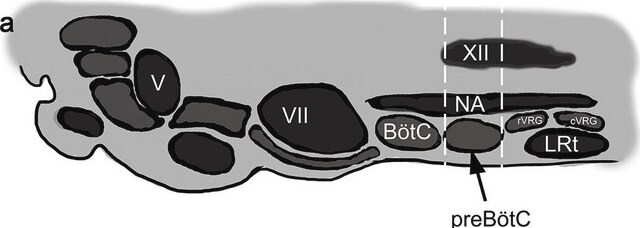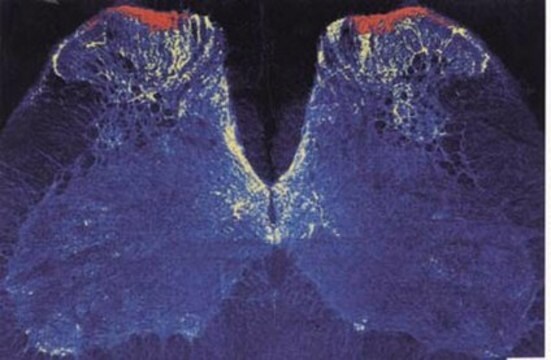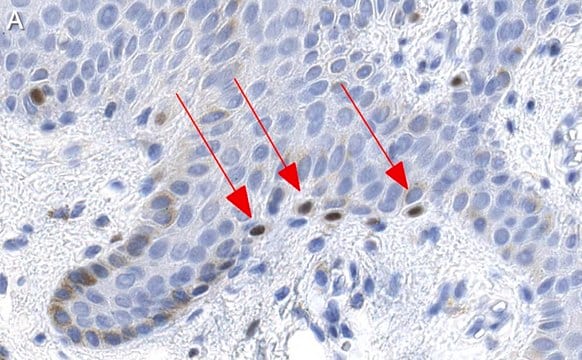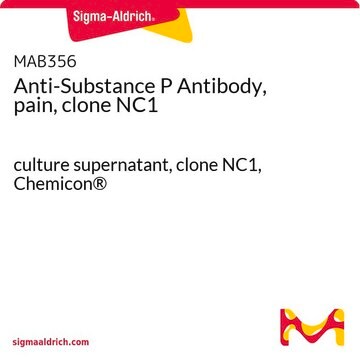추천 제품
생물학적 소스
guinea pig
Quality Level
항체 형태
unpurified
항체 생산 유형
primary antibodies
클론
polyclonal
종 반응성
rat, mouse, human
제조업체/상표
Chemicon®
기술
immunohistochemistry: suitable
western blot: suitable
NCBI 수납 번호
UniProt 수납 번호
배송 상태
wet ice
타겟 번역 후 변형
unmodified
유전자 정보
human ... TACR1(6869)
일반 설명
Substance-P receptor (UniProt P14600; also known as Neurokinin-1 receptor, NK-1 receptor, NK-1R, SPR, Tachykinin receptor 1) is encoded by the Tacr1 (also known as Nk1r, Tac1r) gene (Gene ID 24807) in rat species. NK-1, NK-2 and NK-3 are receptors that mediate the biological activities of tachykinins, including substance P (SP), neurokinin A (NKA), neurokinin B (NKB), ranakinin, kassinin, neuropeptide gamma, and eledoisin, widely distributed in the central and peripheral nervous systems. SP shows the highest affinity toward NK-1R (substance-P receptor) and exerts its biological activities via NK-1R, including addition, depression, chronic inflammation, and cancer progression. The involvement of NK-1R in acute pancreatitis through mediating neurogenic inflammation has also been reported. Upon stimulation by SP, the NK-1R interacts with multiple G proteins, including Gαs, Gαq/11, Gαi/o, Gα12, and Gα13, generating second messengers and activating downstream effector molecules. After binding NK-1R, SP induces a clathrin-dependent internalization of the receptor-ligand complex, SP is then degraded and the receptor is recycled to the cell surface. NK-1R is a 7-transmembrane (32-54, 65-86, 107-128, 149-169, 195-219, 249-270, 284-308) GPCR, having its N-terminal end (a.a. 1-31) at the extracelluar side and C-terminal end (a.a. 309-407) at the cytoplasmic side. There exist a second alternatively spliced human NK-1R isoform that lacks the C-terminal cytoplasmic domain (a.a. 312-407 missing). The full-length form enhances the growth of cancer cells and stimulates the production of cytokines, which up-regulate the truncated form. The truncated form mediates malignancy and is more abundant in colonic epithelial cells from patients with colitis-associated cancer. In cancer cells, the NK-1 receptor is mainly localized on the plasma membrane and in cytoplasm, and occasionally also in the nucleus.
특이성
This guinea pig polyclonal antiserum targets substance P receptor C-terminal end sequence. Target region is absent in human spliced isoform 2.
면역원
Epitope: C-Terminus
KLH-conjugated linear peptide corresponding to the C-terminal end sequence of rat substance P receptor.
애플리케이션
Research Category
Neuroscience
Neuroscience
Research Sub Category
Synapse & Synaptic Biology
Synapse & Synaptic Biology
This Guinea pig polyclonal Anti-Substance P Receptor Antibody, Cat. No. AB15810 detects levels of Substance P receptor, and has been published and validated for use in Immunohistochemistry, and Western Blotting.
Western Blotting Analysis: A 1:1,000 dilution from a representative lot detected substance P receptor in 10 µg of human brain tissue lysate.
Immunohistochemistry Analysis: A 1:500 dilution from a representative lot detected substance P receptor in rat brain tissue sections.
Immunohistochemistry Analysis: A 1:500 dilution from a representative lot detected substance P receptor in rat brain tissue sections.
품질
Evaluated by Western Blotting in rat brain tissue lysate.
Western Blotting Analysis: A 1:5000 dilution from a representative lot detected substance-P receptor in 10 µg of rat brain tissue lysate.
Western Blotting Analysis: A 1:5000 dilution from a representative lot detected substance-P receptor in 10 µg of rat brain tissue lysate.
표적 설명
~58/54 kDa observed. Target band size appears larger than the calculated molecular weights of 46.25/46.32/46.37 kDa (human/mouse/rat) due to glycosylation. Uncharacterized bands may be observed in some lysate(s).
물리적 형태
Format: Unpurified
Guinea Pig polyclonal antibody serum with 0.05% sodium azide
Unpurified.
저장 및 안정성
Stable for 1 year at -20°C from date of receipt.
Handling Recommendations: Upon receipt and prior to removing the cap, centrifuge the vial and gently mix the solution. Aliquot into microcentrifuge tubes and store at -20°C. Avoid repeated freeze/thaw cycles, which may damage IgG and affect product performance.
Handling Recommendations: Upon receipt and prior to removing the cap, centrifuge the vial and gently mix the solution. Aliquot into microcentrifuge tubes and store at -20°C. Avoid repeated freeze/thaw cycles, which may damage IgG and affect product performance.
분석 메모
Control
Rat brain tissue lysate
Rat brain tissue lysate
법적 정보
CHEMICON is a registered trademark of Merck KGaA, Darmstadt, Germany
면책조항
Unless otherwise stated in our catalog or other company documentation accompanying the product(s), our products are intended for research use only and are not to be used for any other purpose, which includes but is not limited to, unauthorized commercial uses, in vitro diagnostic uses, ex vivo or in vivo therapeutic uses or any type of consumption or application to humans or animals.
적합한 제품을 찾을 수 없으신가요?
당사의 제품 선택기 도구.을(를) 시도해 보세요.
Storage Class Code
12 - Non Combustible Liquids
WGK
WGK 1
Flash Point (°F)
Not applicable
Flash Point (°C)
Not applicable
시험 성적서(COA)
제품의 로트/배치 번호를 입력하여 시험 성적서(COA)을 검색하십시오. 로트 및 배치 번호는 제품 라벨에 있는 ‘로트’ 또는 ‘배치’라는 용어 뒤에서 찾을 수 있습니다.
Amelia J Christensen et al.
Cell reports, 17(6), 1699-1710 (2016-11-03)
Spinal dorsal horn circuits receive, process, and transmit somatosensory information. To understand how specific components of these circuits contribute to behavior, it is critical to be able to directly modulate their activity in unanesthetized in vivo conditions. Here, we develop experimental
Congrui Fu et al.
The Journal of physiology, 595(14), 4973-4989 (2017-05-11)
Central hypercapnic hypoventilation is highly prevalent in children suffering from congenital central hypoventilation syndrome (CCHS). Mutations of the gene for paired-like homeobox 2b (Phox2b) are aetiologically associated with CCHS and Phox2b is present in central components of respiratory chemoreflex, such
Jianguo Zhuang et al.
American journal of physiology. Lung cellular and molecular physiology, 313(5), L772-L780 (2017-07-22)
Lethal influenza A (H5N1) induces respiratory failure in humans. Although it also causes death at 7 days postinfection (dpi) in mice, the development of the respiratory failure and the viral impact on pre-Botzinger complex (PBC) neurons expressing neurokinin 1 receptor
VEGF signaling mediates bladder neuroplasticity and inflammation in response to BCG.
Saban, MR; Davis, CA; Avelino, A; Cruz, F; Maier, J; Bjorling, DE; Sferra, TJ; Hurst, RE; Saban, R
BMC Physiology null
Ruyi Huang et al.
The Journal of physiology, 600(12), 2973-2999 (2022-06-01)
Opioid overdose suppresses brainstem respiratory circuits, causes apnoea and may result in death. Epidural electrical stimulation (EES) at the cervical spinal cord facilitated motor activity in rodents and humans, and we hypothesized that EES of the cervical spinal cord could
자사의 과학자팀은 생명 과학, 재료 과학, 화학 합성, 크로마토그래피, 분석 및 기타 많은 영역을 포함한 모든 과학 분야에 경험이 있습니다..
고객지원팀으로 연락바랍니다.